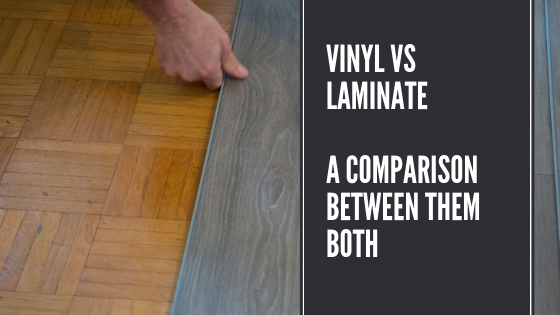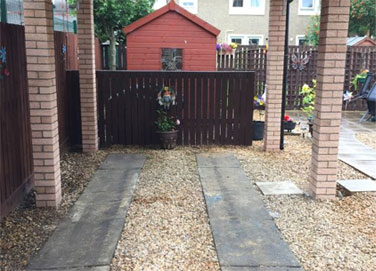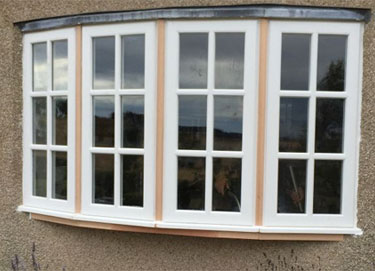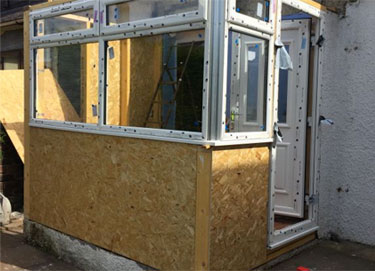Manufacturers promote both products as durable, budget-friendly, DIY-friendly products, and even appearances can be similar, especially if laminates are compared to newer luxury vinyl flooring (LVF) planks.
Like some styles of laminate flooring, luxury vinyl flooring can look remarkably like natural wood and natural stone.
But while the materials have many of the same virtues and may even look much the same, these are much different flooring materials, which becomes apparent when you look at each of them based on a variety of criteria.
Related content:
What Is The Best Kitchen Flooring To Use
Bathroom Flooring – Worst And Best Flooring To Use
Vinyl Flooring
Vinyl flooring is 100 percent synthetic material.
In standard sheet vinyl and vinyl tiles, the base layer is usually fibreglass which is then coated in PVC vinyl and a plasticiser.
The resulting sheet is printed and embossed with a surface print layer.
Over this, one or more wear layers is applied, often a tough layer of “no-wax” polyurethane. Sheet vinyl is known as “cushioned vinyl” features a closed-foam lower layer.
Overall thickness for vinyl ranges from 1.5 mm for sheet vinyl to 5 mm for luxury vinyl planks, making these products decidedly thinner than most laminate flooring.
Laminate flooring is similar to luxury vinyl planks in its look and installation, but the critical difference is that the surface is a hard plastic laminate with printed design layer, while the core layer is rigid fibreboard, a product made from wood byproducts bonded together with melamine resins.
Overall thickness for laminate planks ranges from 6 mm to 12 mm.
Appearance
Not long ago, it was quite easy to distinguish vinyl from laminate flooring.
Vinyl floors were usually sheet goods with printed patterns, often designed to look roughly like ceramic tile, though not very convincingly.
And laminate plank floors were “wood look alike” that was also less than convincing since they looked and felt like the plastic materials they were.
But modern laminate flooring and luxury vinyl can now both look remarkably like wood, stone, ceramics, or just about any material.
They may even have three-dimensional texture to the surfaces, such as forms that resemble hand-scraped hardwood.
Both vinyl and laminates are still less expensive floors than natural hardwood, or ceramic or porcelain tile, but the appearance is considerably less “cheap” than it was a few years ago.
Sheet vinyl may still be a bit of a bargain option, but when comparing luxury vinyl to laminate flooring, there is no longer a clear winner.
Water Resistance
The obvious winner here is vinyl flooring. All forms of vinyl flooring—sheet vinyl, vinyl tile, and luxury vinyl—are made with materials that are 100 percent waterproof.
In family bathrooms and damp locations such as basements, vinyl flooring materials are the clear winner.
Sheet vinyl that comes in 12-foot wide rolls often requires no seams whatsoever, making it the best of all choices for a totally waterproof floor.
DIY Suitability
Sheet vinyl can be a difficult material for do-it-yourselfers to install, but luxury vinyl planks are fairly easy, which is one reason for luxury vinyl’s growing popularity.
Laminate flooring planks, with a comparable click-and-lock installation method, are similarly easy.
In fact, this easy installation system was largely what caused the explosion of interest in laminate floors, since it offered DIYers a means of easily achieving a floor that looked like hardwood.
There is a slight edge toward laminate plank flooring here, as the click-and-lock system is more secure than the current interlocking system for luxury vinyl planks.
An ordinary circular saw or table saw equipped with a fine-tooth blade, or even a hand saw, easily cuts laminate planks.
If you are installing sheet vinyl, though, professional installation is your best bet, since it is quick and not very expensive.
Overview of Vinyl and Laminate
Limitlessly customisable and designable, both vinyl and laminate allow you the versatility you need to complete any interior design project.
Unlike laminate, premium vinyl is durable and stable, resistant to moisture and climate, and is easy to install and maintain.
While costs are similar, the value of premium vinyl far exceeds that of laminate based on quality and value.
Laminate is restricted to light traffic and low moisture applications. Premium vinyl is extremely effective and efficient for nearly any interior situation.
Get in touch today for your floor fitting needs – we are professionals in installing both laminate and vinyl flooring.
Related content:
Laminate Floor Fitters Edinburgh






